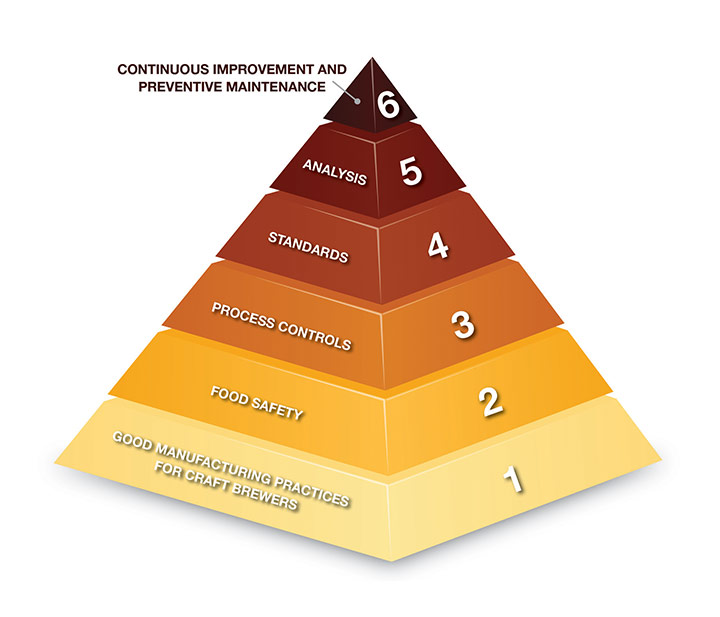
Good Manufacturing Practices for Craft Brewers
Quality Priority Pyramid
The Quality Priority Pyramid provides brewers a visual representation of essential features and the general, prioritized order in which they should be put into practice to develop a solid quality program.

Level 6 Continuous Improvement and Preventive Maintenance
Level 5 Analysis
Level 4 Standards
Level 3 Process Controls
Level 2 Food Safety
Level 1 Good Manufacturing Practices for Craft Brewers
How to Use
The structure of a quality program in a brewery starts with Good Manufacturing Practices and thus is the foundation of the quality pyramid. Tiers towards the top of the pyramid should be approached after the foundation has been established.
Although the pyramid provides a general order in which the components should be implemented, high level tiers can also be addressed before a lower level tier is completely implemented.
Each tier is outlined below to highlight relevant resources and essential features as they relate to a comprehensive brewing quality program.
Level 1: Good Manufacturing Practices for Craft Brewers
Good Manufacturing Practices (GMPs) are the minimum standards that breweries are required to implement by law. These standards must be defined and established before any beer is brewed. The Food Safety Modernization Act (FSMA) requires written standard operating procedures (SOPs), and records for incoming materials and their use throughout production. Documentation is critical for quality control and quality assurance (QC/QA), because it allows comparison of practices to standards. Written records help identify how to correct processes that do not follow GMPs. Good Manufacturing Practices for Craft Brewers provides brewery-specific GMP guidance and checklists.
Level 2: Food Safety
Food safety, as it relates to the consumer, can be effectively managed through a Hazard Analysis and Critical Control Point (HACCP) program. HACCP implementation is not currently mandated for breweries by the Food and Drug Administration (FDA), but its concepts are helpful to ensure that the finished beer will not harm consumers. HACCP involves identifying critical control points (CCPs) throughout the brewing and packaging processes that can prevent the ingress of potential food safety hazards. Once the critical control points have been identified, they are controlled to eliminate the specific potential hazard. For more information see Food Safety Plan for Craft Brewers.
Level 3: Process Controls
Production of beer that is consistent in flavor, taste, color, alcohol content, etc. can be achieved by identification and control of quality control points (QCPs), also known as process controls. The various product parameters can be controlled throughout the brewing process, from raw materials to packaged beer and product handling outside the brewery. Although usually concerned with safety, tools from a HACCP program can be used to aid in this quality control process, as well. Once these process controls are identified, they are monitored to eliminate any negative effects on quality.
Level 4: Standards
Developing clearly defined standards involves outlining detailed attributes for both finished beer and the processes used to produce it. Beer standards include recipes, intended aromas and flavors, and all measurable qualitative and quantitative physical, chemical and biological parameters. Advanced analytical equipment is not necessary to implement product and process standards. Brewers should utilize the equipment that is appropriate for their operation and invest in their quality program as their operation evolves.
Process standards include the establishment of SOPs for:
- All process procedures
- Cleaning and sanitation procedures
- Laboratory procedures
Level 5: Analysis
Analysis should be done routinely to verify:
- Process control
- Product parameters are within set standards
- Product shelf life and stability
Physical, chemical, microbiological, and sensory analysis are all critical elements of complete quality program. In some instances, more sophisticated analyses should be outsourced to an independent laboratory. Integrate analyses into QC and QA protocols.
Level 6: Continuous Improvement and Preventive Maintenance
Breweries should strive to improve their processes and expand the scope of their quality program as production increases. The best quality programs have robust preventive maintenance plans. Scheduling maintenance will result in higher quality processes and reduced down-time. Maintenance will also help prevent some potential food safety hazards.
Additional Information
Breweries of every size need to establish a quality program and set priorities within that program. For an in-depth guide to establishing a quality program and an example quality manual, see Quality Management: Essential Planning for Breweries.
The Quality Pyramid was developed by the Brewers Association’s Quality Subcommittee.
For assistance with your brewery or distillery insurance contact the specialists at G & H Financial Insurance at 281-395-5497.
